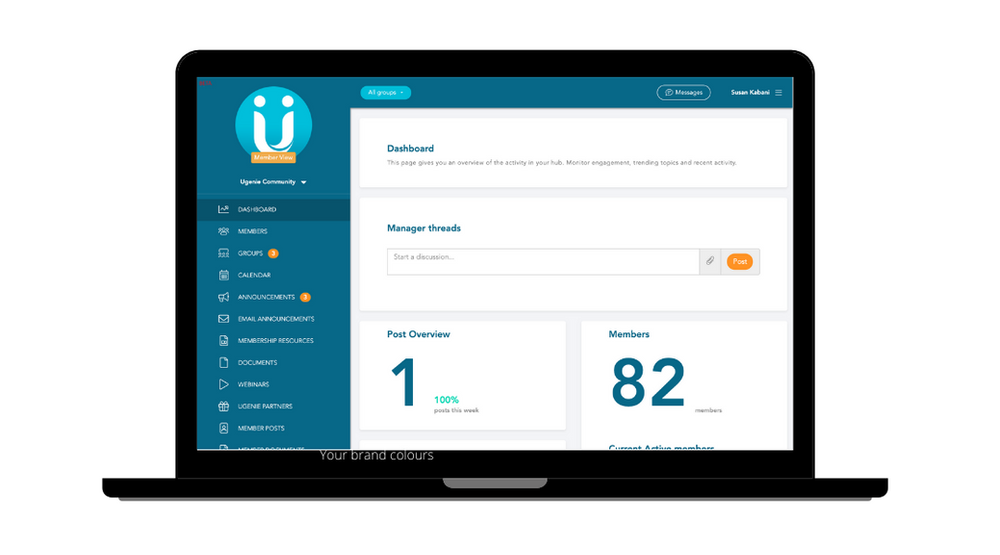Community 2.0: Reasons Why Membership Business Owners Are Abandoning Facebook Groups | Ugenie | Insights
Membership businesses across the online landscape are looking for ways to migrate their online communities and memberships away from Facebook Groups in what we call a move to Community 2.0.
So what is Community 2.0?
Community 2.0 involves private and branded platforms which boast the same features of a social networking platform, but prioritise dedicated web and mobile environments to help build, grow and engage communities of all types. This differs heavily from Community 1.0 where distractions, confused messaging, algorithms, lack of privacy and data mining all prevent community leaders building strong and meaningful networks - especially those that can be sustained over time.
Don't get us wrong. Facebook Groups, an example of a Community 1.0 approach, do carry some utility. They are valuable and a much-needed element for a membership business' marketing strategy as they are arguably still the most popular option for starting an online community and for finding new members to join. However, they just aren't the best place to host your community or membership in the longer term.
So if you find Facebook distracting, are tired of being subject to an exhausting number of algorithm changes, need more advanced functionality for hosting your membership, keep reading. We’re here to tell you that you have other choices!

The business of community does not need to exclusively happen in landmark spaces, despite what digital monopolies like Facebook claim. We explore these concerns to show that there are justifiable reasons as to why membership business owners, who previously used Facebook Groups to manage their communities, are challenging the social media status quo by becoming a part of Community 2.0.
Declining Reach & Increasing Noise
Facebook Groups create the illusion that content is being targeted to all members within. In reality, content posted in a Facebook Group reaches roughly 1-5% of users. “But isn’t this an issue to do with organic reach on Facebook’s feed?” Yes. This still is an issue. But content posted into a Facebook Group becomes visible on the feed. And with more group members, group feeds suffer from similar issues to general news feeds. 2014 is arguably when Facebook’s reach began to decline. Brian Boland, the Vice President of Advertising Technology at the time, stated that Facebook is managing more advertising content than it once used to when exclusively a social networking and discovery platform. (And this has not decreased in the past few years.)

In essence, Facebook has become a platform that prioritises adverts and not the content and interactions that users would genuinely love to witness and experience. Reach becomes an issue within Facebook Groups when noisy and cluttered news feeds distract users from engaging with the communities that most interest them. Further, ongoing changes to Facebook’s algorithm means community leaders running groups face gambles when distributing content.
Simon Hartley is the founder of CEO Central, a networking group for Managing Directors. He joined uHubs instead of opting for a Facebook Group. He mentioned that on Facebook, the likelihood of his content appearing in front of the right people seemed to be diminishing. You too have the choice and chance to try something new, like uHubs, to actionably improve the reach and engagement associated with your content strategy and decisions.
Limited Community Monetisation Options
There’s no real or easy way to monetise a Facebook Group. That’s because Facebook does not offer community leaders the option of monetising their communities. Facebook Groups are therefore limited in hosting key elements of a membership business despite being a target audience directory. It is true that Facebook Groups can be monetised externally by adding websites or payment links within. However, there is no payment integration system, meaning that membership business owners have to find another app or piece of software to manage this part. (Interestingly, they did try out paid FB groups in a limited capacity a few years ago). Also, in Culture Building Strategies for Virtual Academies, we mentioned that course creators would benefit from requesting feedback, focusing on rewards-based learning, encouraging project collaboration and diversifying their learning content options. Course creators, coaches or virtual academies require a Learning Management System (LMS) to deliver learning as well as a social learning group or network to unite students. By opting for Facebook Groups for social learning groups, a creator must then find an effective LMS. uHubs, and other online community platforms allow creators to manage a group or network and deliver learning in tandem. It’s more efficient! That’s one of the key reasons why John F Kelly and Paul J Barbour, the founders of The Connected Salesperson, chose uHubs to host their membership offering for sales professionals. They find curating, creating and organising their learning resources useful with our efficient content management system that is LMS-esque.
Limited Control
As Uversity succinctly put it, “Facebook decides your fate” where users are subject to “a revolving door [of] changes”. These changes, which affect membership business owners’ activity, and ultimately their lives, are not made on a democratic basis at all. There’s facelessness associated with collecting feedback and suggestions through Discussion Boards and then ignoring a user’s data, privacy and algorithm concerns. Facebook users, including Group creators, are left with little control over Facebook’s policy, updates and business practices.
In September 2020, TechCrunch reported that Facebook decided to introduce new policies regarding their groups.

One policy includes requiring groups to have an active admin, instead of freely letting community leaders be flexible with giving their attention to the group.
Another said that groups that violate the rules would be closed, which is alarming to us as we have met several group owners who get put in what one called 'Facebook jail' without being told why. When she tried to contact FB, it took her ages to get any sort of resolution or answer for her banishment. In The 7 Best Membership & Subscription Community Platforms, we note that we develop features and updates based on requests, to be democratic in what our clients actually want and prefer. On a broader scale, one of the reasons why we started Ugenie was to give both membership business owners and users more control over the data and terms in their community. A Group creator does not own their audience’s personal data. Understanding and protecting members’ information is limited. There’s a historical timeline of privacy issues associated with Facebook. The Facebook data privacy scandal, which centered around Cambridge Analytica collecting personal information of up to 87 million people for political purposes, was a massive breach of trust. Such breaches of trust are motivating both membership business owners and general users to close Facebook for good.
No Customisation Options
If a membership business owner goes through the effort of developing a Facebook Group to engage users on Facebook’s infrastructure, is it fair to offer no customisability of the space? Probably not. A logo, cover photo, some colour customisation and a description is the extent of Facebook’s customisation features. There’s are no custom domains, ability to turn off features or branded text or gateways for certain content. Therefore, a community residing in a Facebook Group may be washed away in endless others by aesthetically unappealing design and a lack of distinguished branding. Being able to customise a community is not just important, but essential.
That’s because each business has different qualities which require tailored image and design. Facebook Groups mean these membership-based brands are not adequately reflected to audiences. Though brand consistency on Facebook can be improved via reviewing mission statements, developing brand guidelines, uniting visual elements and conducting brand audits, a dedicated hub with customisability may be more of a robust solution to online dilution.
Membership brands need to foster a feeling of trust, recognition and memorability. That’s why Ugenie gives the chance for membership business owners to customise their private hub. We want our hub owners to stand out as authentic whilst marketing online.
No Subgroups
If members of a community have heterogeneous characteristics and carry different interests, they may bond with people better within subgroups or sub-communities. Facebook Groups is a sure way to limit audience segmentation. There are not many ways to build smaller communities within a larger group. This means that content posted by both group members and group admins can become aimless, generic and ineffective.

According to Cutting Edge PR, audience segmentation is a process of dividing an audience into smaller groups so that they can receive the service and communication they desire. Messages sent to a broad cross-section of an audience are less likely to be effective. There’s a difference between causing ‘higher-order’ change, such as behaviours, and ‘lower-order’ change, such as awareness, with content. Facebook Groups fail with the former, which is the most important. Alongside this, communicators must ensure that their messages are tailored and relevant. Ugenie and other online community platforms provide subgroups and spaces within a primary hub whilst also giving the option to segment an audience through member types and groups. By letting members switch their attention between different topics and types of content within smaller hubs, interaction can be segmented well, and content can become more relevant to each individual. We previously mentioned the data and privacy issues associated with Facebook Groups. On our hubs, membership business owners can choose to make their groups private, public or secret, offering a greater range of privacy options and chances of exclusivity.
Be a Part of Community 2.0
If you want to migrate your community away from a Facebook Group, or look to start a community on a platform that’s different to Facebook, there are things to consider before taking the next steps. The main step involves choosing an online community platform that is right for you. In The 7 Best Membership & Subscription Community Platforms, we analyse some of the most sought after options on the market to help guide your decision to migrate. Below is a list of some of the questions to ask when leaving a Facebook Group for another membership hosting option. There’s no expectation for you to have it all figured out! It’s actually our job to guide you on these questions with more resources:
Is the platform available on both website and mobile?
Can the community be branded as my own?
What budget do I allocate for platform changing?
Will my members prefer a Facebook Group or a community platform?
How can I help my members move from Facebook?
Irrespective of what choice you make, Community 2.0 is a very real trend that’s granting more freedom, opportunity and equality for membership business owners online. We would love for you to join our journey on the path to the world of Community 2.0!
If you are a community leader, or in the business of community, try a Ugenie hub, for free, for 45 days.
Share this
You May Also Like
These Related Stories

Using Facebook Alongside an Online Community Platform

How Ugenie works

